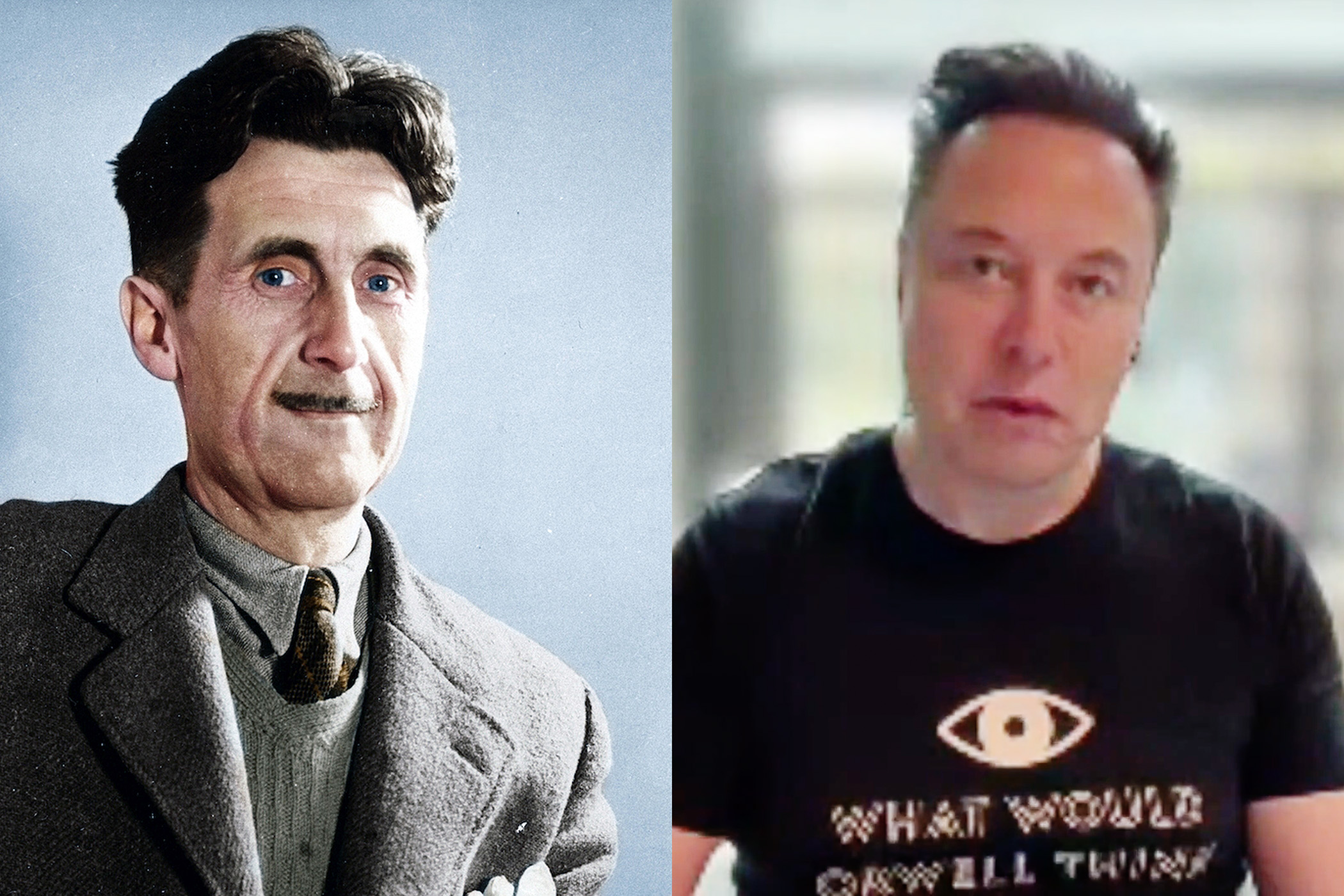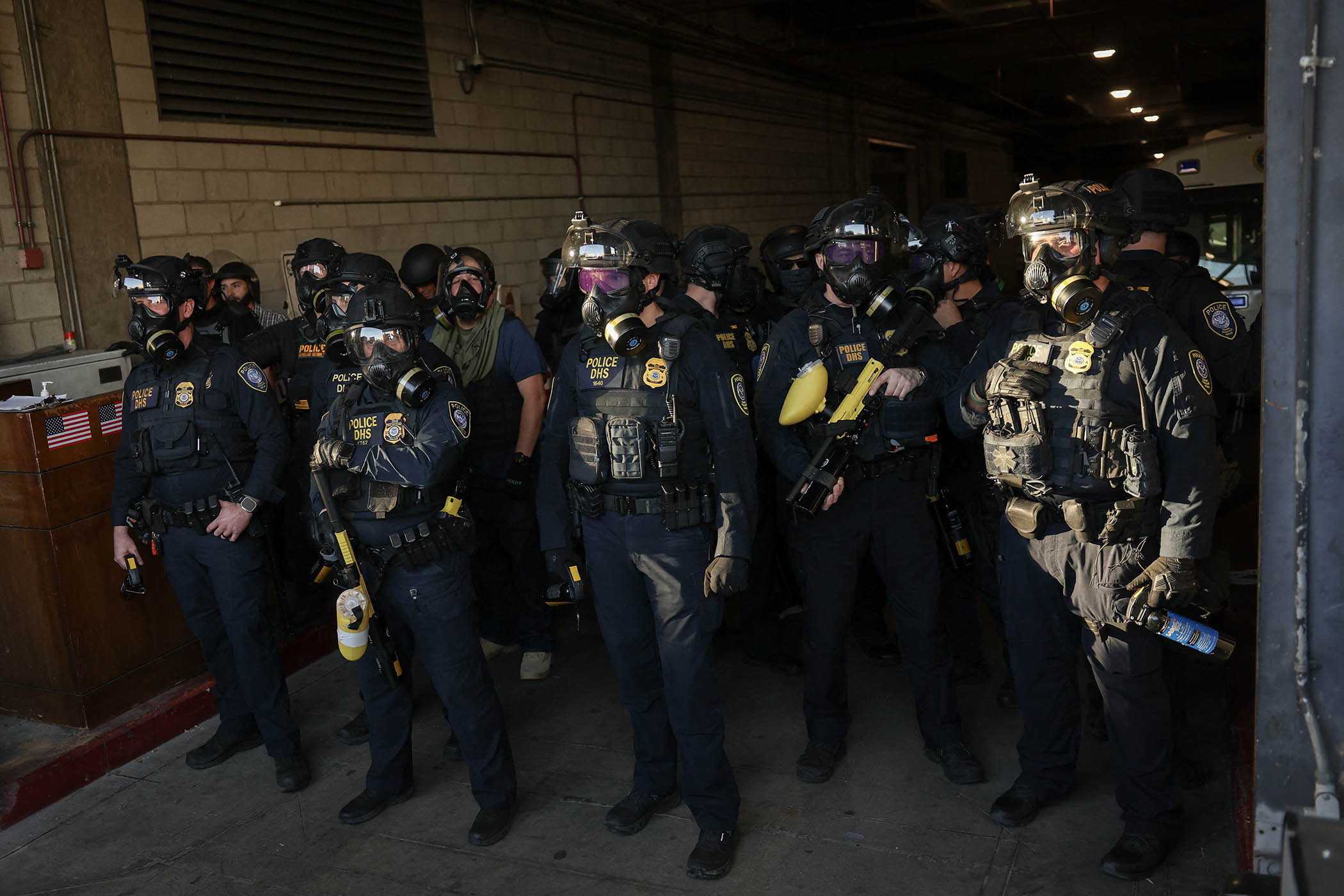I was so absorbed in the spectacle of Elon Musk’s video-link harangue to the Unite the Kingdom rally last weekend – one of those performances that manage to be absurd and terrifying at the same time – that it took me a moment to register the slogan on his T-shirt.
But no, there it was, a stark, four-word enquiry accompanied by a menacing Big Brother-style eye: “What would Orwell think?” The irony of a man who may be regarded as the 21st century’s leading demagogue invoking the 20th century’s greatest exposé of demagoguery in his own support may have escaped Mr Musk, but it will have been painfully apparent to anyone who has ever mused over the prophetic qualities of Nineteen Eighty-Four.
So, leaving aside the fact that all speculation about the dead is ultimately profitless, what would Orwell think? What, in particular, would he think of Elon Musk? One thing he certainly thought as Nineteen Eighty-Four inched towards publication in the summer of 1949 was that the novel would be used as a propaganda tool by the American Right. The final volume of his Collected Works contains a “statement” circulated in the US in which Orwell confirms that the novel is not an attack on socialism but a “show-up” of totalitarianism per se, and among the many cares that oppressed him as he went to his death in January 1950 was an awareness of the malign uses to which the book would be put by people he regarded as his political opponents.
Elon could have found a place in Big Brother’s cabinet devising exciting new bombs and methods of mind control
Elon could have found a place in Big Brother’s cabinet devising exciting new bombs and methods of mind control
By and large these fears were realised. Three-quarters of a century later, if the American Left (with one or two pointed exceptions) rates Orwell as a good guy, then the American Right sees him as a kind of secular saint, a lightning rod for all the ills that oppress our fraught and contested planet.
As a veteran of countless US Orwell podcasts, I can confirm that there invariably comes a moment when the courteous and gravel-voiced host pauses to enquire: “Can I take it, Mr Taylor, that Orwell would have given those Commies hell?” No doubt Orwell would – this, after all, was a man who escaped from Republican Spain in 1937 with a Soviet hit-squad on his tail – but, equally, he would have been appalled by the highly selective prism through which his work is seen by the modern-day Muskites.
Take, for example, the adjective constructed out of his name. “Orwellian”, we can infer from Nineteen Eighty-Four, means something like “the suppression of individual and collective liberty by way of the denial of objective truth, tampering with the past, the manipulation of language and the use of intrusive surveillance technology.”
To a modern US Republican, on the other hand, it means practically any kind of interference – however well-intentioned or legally justifiable – with the autonomy of the person being interfered with. A politician having his book proposal turned down by a publisher is no longer a matter of taste or commercial nous, it’s Orwellian.
Orwell never visited America, but the country was a source of fascination to him, and at least one American novel got tangled up in the roots of Nineteen Eighty-Four. This was The Iron Heel (1908), a lesser-known work by The Call of the Wild’s author Jack London, in which a gang of capitalist robber barons wrest control of the country with the aid of a mercenary army and start exploiting it for private gain.
London is a more reliable guide to the future than dystopia-merchants such as HG Wells, Orwell insists, as he understands – and here the foreshadowing of Maga turns yet more ominous – that a ruling class needs to have “a quasi-religious belief in itself, a mystique”. Then there is the fact that Musk and the rest of the Silicon Valley lords of time are not politicians but technocrats.
Among other things, Nineteen Eighty-Four is testimony to Orwell’s belief – something he acquired from the influential American political theorist James Burnham, author of The Managerial Revolution (1941) – that the power-basis of the modern world was changing. Surveying the ruins of a postwar landscape laid waste by military conflict, Orwell predicted the societies of the future would not be governed by emperors, or politicians, or military strategists, but by technicians and planners – men in white coats rather than suits or braided jackets.
Newsletters
Choose the newsletters you want to receive
View more
For information about how The Observer protects your data, read our Privacy Policy
If Musk lacks Big Brother’s charisma – our man is said to have a face “full of power and mysterious calm”, whereas Elon here looks rattier and more nerve-ridden – then he could undoubtedly have found a place in his inner cabinet devising exciting new bombs and methods of mind control.
But what would perhaps have depressed Orwell above all is the subversion of an American dream he himself had bought into at a very early age. Inside the Whale (1940) contains a terrific paean to the poet Walt Whitman, to whom “liberty” was not merely a highly desirable abstract but something available at the end of every prairie track.
In mid-19th-century America, Orwell writes, “men felt themselves to be free and equal... There was poverty and there were even class distinctions, but except for the Negroes there was no permanently submerged class.”
This, naturally, is a big “except” – and Orwell’s view of pioneer-era America can seem absurdly romanticised – but what emerges from it is a profound conviction that Whitman’s generation had found a way to live that was worth emulating.
A century and a half later, you suspect that George Orwell would regard Elon Musk as chief standard-bearer of what he called “the smelly little orthodoxies that are now contending for our souls”.
Orwell: The New Life by DJ Taylor is published by Constable. Order a copy from observershop.co.uk for £14.99. Delivery charges may apply
Photographs by Pictures from History/Universal Images Group via Getty Images, BBC


